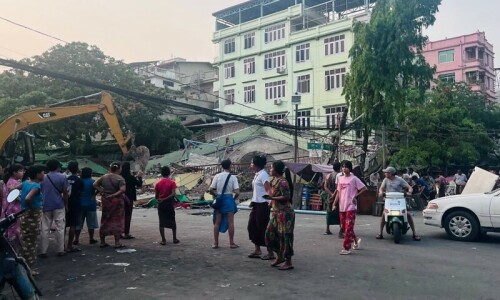Rajiv Gandhi was perhaps cut from a different cloth. In sharp contrast to Indian Prime Minister Narendra Modi’s refusal to attend the South Asia Association for Regional Cooperation (Saarc) summit meeting in Islamabad, Rajiv sought to break the ice with Pakistan at the 1988 Saarc summit meeting, also held in Islamabad. He arrived a second time in July 1989, this time to focus on the lingering dispute over Siachen, the world’s highest and deadliest battleground.
Bitter battles had been raging over Siachen between Pakistan and India since April 13-14, 1984, when Indian troops occupied unmanned ridges hitherto unmarked in both countries’ records. Subsequently, India claimed victory over the glacier in the Kashmir valley. Since 1947, this was the first time that India had moved its troops in this uninhabited mountainous range where the border had not been demarcated. There have been many skirmishes between troops over Siachen ever since, leaving the need for a final settlement of a battleground where inhospitable climatic conditions have killed more men than armed combats.
In 1987, there were fierce battles again but six days of fighting ended in a no-win position. Pakistani troops confined Indians to their positions and did not venture into Indian territory either.
Amidst this backdrop, Prime Minister Benazir Bhutto held a banquet to honour her Indian counterpart, who had arrived on the evening of July 16, 1989. Since Rajiv was returning on a trip to the (now defunct) Soviet Union, there was no previously agreed upon agenda. Therefore, proceedings of the meetings held during the ’88 Islamabad summit formed the basis of further talks.
Rajiv Gandhi and Benazir Bhutto pledged to find a permanent solution to the battlefield that neither country could conquer in 1989. Some three decades later, the war continues
In ’88 the two premiers had agreed on three steps: prohibiting each other from attacking nuclear installations, enhancing cultural cooperation and facilitating civil aviation. Benazir and Rajiv had also agreed to ensure that talks took place at the defence secretary level in a bid to find some resolution to the rocky issue of Siachen.
After back-channel diplomacy, the defence secretaries had reached an agreement. The joint statement after the accord said: “There was agreement by both sides to work towards a comprehensive settlement, based on redeployment of forces to reduce the chances of conflict, avoidance of the use of force and determination of future positions on the ground so as to conform with the Simla Agreement and to ensure durable peace in the Siachen area. The army authorities on both sides will determine the positions.” In the follow-up to this agreement, Pakistan demanded that troop positions return to the pre-1972 positions, as agreed in the Simla Agreement.
Therefore, when Rajiv arrived in ‘89, the agenda turned out to be focussed and serious.
At the banquet, Benazir described the dispute over the Siachen Glacier as a “flashpoint” that could trigger a greater calamity. Indeed, the two countries had been bickering over Siachen and drawn into skirmishes for over five years at the time. Although she touched upon all subjects in her speech, she clarified that she was in favour of an early agreement on Siachen. She also demanded a step-by-step solution.
“We seek an end to clashes and conflicts that have led to the loss of so many lives,” replied Rajiv.
Before the talks had begun, political observers in both camps were not hopeful of any advancement in policy decisions and expressed scepticism. Most argue that both premiers were beset by too many problems at home for these foreign policy negotiations to yield successful results. Some even remarked that Rajiv’s short visit was unlikely to generate an atmosphere conducive for lasting peace.
And this proved to be the case, as the years to follow saw little development in the peace process. Even 27 years later, with Rajiv Gandhi and Benazir Bhutto both gone, the two countries have yet to work out a pathway to peace.
Published in Dawn, Sunday Magazine, October 16th, 2016















































